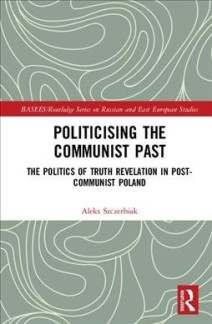Poland’s secrets and lies

Fair use for review purposes
Lustration, the systematic vetting and exclusion from high office of communist-era secret policemen, secret police informers and (sometimes) top-ranking Party bosses, has rather slipped out of the headlines in recent years.
The occasional high-profile case still surfaces. The Bulgarian authorities’ recent revelations that the psychoanalyst and philosopher Julia Kristeva collaborated with the country’s secret police in the early seventies to buy a few favours from the regime for family and friends, for example, briefly garnered considerable international media attention.
But these are the exceptions not the rule. The passage of time has blunted the relevance of lustration laws – anyone not now in their mid-late forties would have been children when communism fell.
And politically, a quarter of a century since the fall of communism, many Central and East European countries have either done what lustration they can or want to do, or bypassed the issue and let communist-era securocrats blend seamlessly into the new political and administrative elites. The recently “re-elected” Vladimir Putin epitomizes this second pattern.
Not so in Poland, argues Aleks Szczerbiak in his new book.
A Polish paradox

Photo: MEDEF (Flickr) [CC BY-SA 2.0], via Wikimedia Commons
In Poland, he argues, lustration came surprisingly late and remained surprisingly contentious surprisingly long, lacking any fixed form as politicians and courts fought it out over different sets of proposals, procedures and legislation.
The book meticulously unwinds the twists and turns of lustration debates and laws, taking in major controversies such as the accusations, now seemingly proved, that Lech Wałęsa was, for a period in the early seventies as a relatively obscure working-class activist, an active informer for Poland’s communist secret police, the SB.
Szczerbiak chronicles how any notion that Poland’s negotiated exit from communism implied the simple drawing a ‘thick line’ under the communist past, to use prime minister Tadeusz Mazowiecki’s much misused phrase, gave way to legislative measures. As elsewhere in Eastern Europe, the impetus was both to manage the secrets in the files and to embed post-communist democracy in at least some degree of transitional justice.
Although ruling out forgetting, Poland’s first (1992, 1997) lustration laws were relatively forgiving. The law framed in 1997 punished those who made false declarations about past collaboration with the communist security police, rather than all collaborators per se, and was understood in terms of ‘truth telling’.
However, unlike South Africa’s confessional process about involvement with the old regime’s repressive apparatus, truth-telling in Poland was not a source of reconciliation or social catharsis, but a focus of intense political contention.
Demands for tougher, more wide-reaching, more easily operable lustration, largely driven by the political right, led to the passing new legislation in 2006 bringing the Institute of National Remembrance into the process and considerably widening the scope of lustration to include lawyers, journalists and academics. This was later narrowed when Poland’s Constitutional Tribunal struck out key parts of the new legislation.
Drilling down

Photo: Daniel Kulinski True story via photopin (license)
The comparative literature on lustration has, like other comparative literatures, has spent a lot trying to distill the causes of lustration into generalisable propositions, picking from a familiar menu of social science explanations.
Were the politicians basically pinned down by legacies of roundtable settlement of 1989; driven by their own, genuine, ideological motivations; struggling to meet voter demand (Polish public opinion was, Szczerbiak notes, generally toughly anti-communist on lustration issues); or using the issue instrumentally to out-manoeuvre opponents?
Drilling down into the specificity of the Polish case, the book uncovers some complex patterns that do not sit well with the parsimonious simplification prized by comparative political scientists – and, indeed suggest that, poorly done, seeking them out can be positively dangerous.
Too many studies, its seems, riff skilfully making the case for one or other grand explanation – ideology/culture, electoral competition, the constraining institutions – without really yielding any truly compelling insights. At least one major comparative study covering Poland, Szczerbiak notes, not only rests on big unevidenced assumptions about post-communists Social Democrats’ accession to the secrets of the secret police files, but badly muddles its facts in ways that undermine some of its key arguments.
Lustration without anti-communism?

Photo: kalleboo Polish Zloty via photopin (license)
Although the legacies of transition arguments fall by the wayside – meaning that Poland’s late and ongoing lustration is best interpreted as some form of politics of the present – no neat alternative master explanation emerges unscathed from the book.
The lustration issue does become increasingly owned by the conservative right – many of the voices quoted are from Poland’s current conservative ruling party Law and Justice (PiS), who see corrupt nomenklatura networks and values as at the heart of a corrupt left-liberal establishment (Układ). Tough lustration clearly fits well with the once influential conservative project of re-founding post-communist Poland as a morally renewed ‘Fourth Republic’.
The book stops short of considering if and how right-wing projects for coming to terms with the communist past feed into the current Polish government’s efforts to remake the country’s institutions – a bold, misunderstood, project of conservative state reform deepening democracy, or a wanton power grab trashing institutions with likely fateful consequences for Polish democracy, depending on your point of view.
But its fine, nuanced scholarship does highlight other issues: perhaps most interestingly that, at some points – and in some forms – lustration was project backed by Polish liberals in the name of the transparency and accountability of the governors to the governed.
In the era of the Panama Papers it is tempting to think of this less as the unfinished business of communism, than a variant of very contemporary demands that citizens really have a right to know what kind of people are ruling them.
These days, however, we more often want the ‘lustration’ political elites not for wrongdoings under authoritarianism, but for illicit property holdings and concealed business relationships. Debates about data privacy and a ‘right to be forgotten’ similarly parallel lustration debates about how far transitional justice should go – and where and how to forgive past crimes and misbehaviour.
In this sense lustration and anti-communism may be parting company. Conservative-national governments Poland and Hungary have bigger targets to aim at and bigger and heavier weapons to train on them than hard-to-operate lustration laws.
Instead lustration-like mechanisms such as asset declarations and the policing of politicians’ financial interests have become more central to anti-corruption in its both liberal and populist forms.
This post is based on remarks made at an event at the Polish Embassy on 16 March 2018 to launch Aleks Szczerbiak’s Politicising the Communist Past: The Politics of Truth Revelation in Post-Communist Poland published in the BASEES/Routledge Series on Russian and East European Studies.
You must be logged in to post a comment.